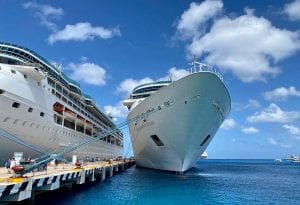Passengers with food allergies on a cruise can sail safely. However, they must inform their cruise line of their dietary restrictions.

Viking Cruise cooks prepare healthy meals.
Several years ago, I went to the breakfast buffet on a Baltic cruise and saw golden pancakes. All the placards in front of them said, “Pancakes.” I decided they were for me. I smeared on a bit of butter, then poured some syrup on the small stack. Suddenly, my food allergies on a cruise ruined my vacation.
When I took the first bite, I knew I was in trouble. The label didn’t say it, but they were banana pancakes. I have a severe banana allergy. I can’t even touch banana skin.
Medications and Epi-Pen come to the rescue.
I ran to our stateroom and grabbed my allergy medication, but I was already covered in hives from head to foot and anticipating breathing difficulties. I had my Epi-Pen ready. It took much of the day, but by dinner, I was okay but missed much of the day’s activities. Food allergies on a cruise already had taken a toll.
I spoke to the head of the dining room. He called in the head chef. I explained my problem and said that while I should have asked, I thought the pancakes should have been identified as containing bananas. They agreed that food allergies on a cruise were dangerous. They had changed many labels by the next buffet to identify the food better. They also sent me menus for the remaining meals so I could be sure of the ingredients.
Ships’ culinary staffs routinely handle dietary issues but need to know about your problems in advance.
They explained how they routinely handle passenger dietary issues during our conversation. Passengers merely had to present their dietary restrictions to the cruise line in advance. I didn’t know that. As our discussion ended, the ship’s executive chef told me that if allergies at a particular meal were a problem or I saw nothing appealing on the menu, I should ask, and they would make me something off-menu. I took him up on the offer a few times and enjoyed excellent steak and seafood meals.
Many people regularly cruise with dietary problems that are significantly worse than mine. They know that all it takes to eat safely is to be proactive about their diet with their cruise line.
I have seven commonsense suggestions for those with food allergies on a cruise.

Photo by Kevin Bluer Unsplash.com
Since that cruise, I’ve eaten well at sea, despite my dietary limitations. If you have dietary restrictions, I’ve got seven commonsense suggestions for you to enjoy your cruise meals despite your allergies or other nutritional needs.
Inform your cruise line of your dietary restrictions:
Suppose you have severe food allergies like me or special dietary needs such as gluten-free, lactose-free, low salt, low cholesterol, vegetarian, vegan, halal, or kosher diets. In that case, you need to inform your cruise line of your needs explicitly.
Check reviews and cruise line web-based dietary information:
Before you book your cruise, check reviews and the cruise line’s website for details about how your cruise line handles guests with dietary restrictions.
Immediately after booking your cruise, contact your cruise line to explain your dietary restrictions.
As soon as you book your cruise:
When you book your cruise, tell the cruise line your dietary needs directly or through your travel agent. Do it on the day you book your cruise, if possible. Some dietary restrictions are typically handled by many cruise lines automatically, particularly on larger ships, which need to cater to a large variety of food tastes and conditions.
Like other cruise lines, Royal Caribbean, for example, accommodates food allergies, gluten-free, kosher, low-fat, and low-sodium diets. They have vegetarian meals in the main dining room on all menus, and guests can request vegan dishes. They also offer lactose-free, soy milk or Ensure, and kosher meals at no extra charge. Cruise lines require guests to notify them of their special dietary needs at least 45 days before sailing, but for European or South American cruises, 90 days advanced notice.
That said, it’s safer if you assume nothing about your cruise line’s ability to accommodate your diet, especially when they say it’s automatic. If your restrictions are as severe as mine, contact your cruise line to ensure that your meals will be safe and wonderful.
Confirm your dietary restrictions with the culinary staff once aboard your cruise ship.
Once on board:
Once on board your ship, speak with its culinary staff at embarkation. Staff should already know about your dietary needs, but confirming the instructions in person is good. It helps to put a face on the instructions. They’re always among the very first people I seek once on board my cruises. Review your dietary restrictions with them and always say how much I’m looking forward to the culinary delights they will prepare.
I ask to be able to review the menus in advance to make sure I don’t get into trouble. Using the menus, I’ll know if I need to inquire about any of the dishes’ ingredients. Don’t forget to thank them for their help. Thanks go a long way.
Ask about a galley tour:
At the end of our discussion, while some ships have scheduled galley tours, I always ask if I can get one. Most of the time, they’re happy to give me a personal galley tour but schedule it a day or two later. Sometimes they’ll immediately say, “Sure. Follow me.” Asking for a time shows your interest, and you’ll get to see how good the kitchen operation is.
Never hesitate to explain how severe your dietary restrictions are to the culinary staff.
For severe dietary problems, always explain how serious they are:
In some kitchens, cookware is quickly recycled from dish to dish with a quick wet wipe, not a thorough washing. A friend of mine has a severe seafood allergy. If food is cooked in a pot or pan with seafood without a thorough cleaning, she will have a terrible reaction. If your food allergies are severe, explain them to the culinary staff. They will understand and work to keep you safe.
If you’re not knowledgeable about the ingredients in foods you wish to eat, ask what’s in them.
At the buffet or grill:
Be careful if you’re eating at a buffet or grill for any meal. Please don’t repeat my Baltic folly. If the food isn’t labeled with its ingredients, ask what’s in it or eat something else.
If I can impart any final advice to those, who, like me, have serious food allergies and dietary restrictions, it’s this — “Ask, don’t assume!”
Don’t assume the food doesn’t contain ingredients that you can’t eat. Ask about it. Don’t assume.
Cruise lines can accommodate almost every dietary restriction, but they must know about them to help you. Discuss your diet with your cruise line well before sailing and then the culinary staff on board your ship.

READ ALSO:
7 shipboard mistakes that could sink your cruise
What airline passenger changes may look like in a couple of years
After many years working in corporate America as a chemical engineer, executive and eventually CFO of a multinational manufacturer, Ned founded a tech consulting company and later restarted NSL Photography, his photography business. Before entering the corporate world, Ned worked as a Public Health Engineer for the Philadelphia Department of Public Health. As a well known corporate, travel and wildlife photographer, Ned travels the world writing about travel and photography, as well as running photography workshops, seminars and photowalks. Visit Ned’s Photography Blog and Galleries.



